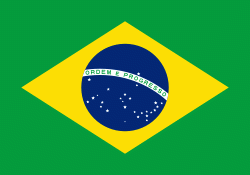Portuguese language
Portuguese (português or, in full, língua portuguesa) is a western Romance language of the Indo-European language family, originating in the Iberian Peninsula of Europe. It is an official language of Portugal, Brazil, Cape Verde, Angola, Mozambique, Guinea-Bissau and São Tomé and Príncipe, while having co-official language status in East Timor, Equatorial Guinea, and Macau. A Portuguese-speaking person or nation is referred to as "Lusophone" (lusófono). As the result of expansion during colonial times, a cultural presence of Portuguese speakers is also found around the world. Portuguese is part of the Ibero-Romance group that evolved from several dialects of Vulgar Latin in the medieval Kingdom of Galicia and the County of Portugal, and has kept some Celtic phonology in its lexicon.
With approximately 250 million native speakers and 24 million L2 (second language) speakers, Portuguese has approximately 274 million total speakers. It is usually listed as the sixth-most spoken language, the third-most spoken European language in the world in terms of native speakers and the second most spoken Romance language in the world, surpassed only by Spanish. Being the most widely spoken language in South America and all of the Southern Hemisphere, it is also the second-most spoken language, after Spanish, in Latin America, one of the 10 most spoken languages in Africa, and an official language of the European Union, Mercosur, the Organization of American States, the Economic Community of West African States, the African Union, and the Community of Portuguese Language Countries, an international organization made up of all of the world's officially Lusophone nations. In 1997, a comprehensive academic study ranked Portuguese as one of the 10 most influential languages in the world.
When the Romans arrived in the Iberian Peninsula in 216 BC, they brought with them the Latin language, from which all Romance languages are descended. The language was spread by Roman soldiers, settlers, and merchants, who built Roman cities mostly near the settlements of previous Celtic civilizations established long before the Roman arrivals. For that reason, the language has kept a relevant substratum of much older, Atlantic European Megalithic Culture and Celtic culture, part of the Hispano-Celtic group of ancient languages. In Latin, the Portuguese language is known as lusitana or (latina) lusitanica, after the Lusitanians, a Celtic tribe that lived in the territory of present-day Portugal and Spain that adopted the Latin language as Roman settlers moved in. This is also the origin of the luso- prefix, seen in terms like "Lusophone."
Between AD 409 and AD 711, as the Roman Empire collapsed in Western Europe, the Iberian Peninsula was conquered by Germanic peoples of the Migration Period. The occupiers, mainly Suebi, Visigoths and Buri who originally spoke Germanic languages, quickly adopted late Roman culture and the Vulgar Latin dialects of the peninsula and over the next 300 years totally integrated into the local populations. Some Germanic words from that period are part of the Portuguese lexicon. After the Moorish invasion beginning in 711, Arabic became the administrative and common language in the conquered regions, but most of the remaining Christian population continued to speak a form of Romance commonly known as Mozarabic, which lasted three centuries longer in Spain. Like other Neo-Latin and European languages, Portuguese has adopted a significant number of loanwords from Greek, mainly in technical and scientific terminology. These borrowings occurred via Latin, and later during the Middle Ages and the Renaissance.
Portuguese evolved from the medieval language, known today by linguists as Galician-Portuguese, Old Portuguese or Old Galician, of the northwestern medieval Kingdom of Galicia of which the County of Portugal was part. It is in Latin administrative documents of the 9th century that written Galician-Portuguese words and phrases are first recorded. This phase is known as Proto-Portuguese, which lasted from the 9th century until the 12th-century independence of the County of Portugal from the Kingdom of León, which had by then assumed reign over Galicia.
In the first part of the Galician-Portuguese period (from the 12th to the 14th century), the language was increasingly used for documents and other written forms. For some time, it was the language of preference for lyric poetry in Christian Hispania, much as Occitan was the language of the poetry of the troubadours in France. The Occitan digraphs lh and nh, used in its classical orthography, were adopted by the orthography of Portuguese, presumably by Gerald of Braga, a monk from Moissac, who became bishop of Braga in Portugal in 1047, playing a major role in modernizing written Portuguese using classical Occitan norms. Portugal became an independent kingdom in 1139, under King Afonso I of Portugal. In 1290, King Denis of Portugal created the first Portuguese university in Lisbon (the Estudos Gerais, which later moved to Coimbra) and decreed for Portuguese, then simply called the "common language," to be known as the Portuguese language and used officially.
In the second period of Old Portuguese, in the 15th and 16th centuries, with the Portuguese discoveries, the language was taken to many regions of Africa, Asia, and the Americas. By the mid-16th century, Portuguese had become a lingua franca in Asia and Africa, used not only for colonial administration and trade but also for communication between local officials and Europeans of all nationalities. The Portuguese expanded across South America, across Africa to the Pacific Ocean, taking their language with them.
Its spread was helped by mixed marriages between Portuguese and local people and by its association with Roman Catholic missionary efforts, which led to the formation of creole languages such as that called Kristang in many parts of Asia (from the word cristão, "Christian"). The language continued to be popular in parts of Asia until the 19th century. Some Portuguese-speaking Christian communities in India, Sri Lanka, Malaysia, and Indonesia preserved their language even after they were isolated from Portugal.
The end of the Old Portuguese period was marked by the publication of the Cancioneiro Geral by Garcia de Resende, in 1516. The early times of Modern Portuguese, which spans the period from the 16th century to the present day, were characterized by an increase in the number of learned words borrowed from Classical Latin and Classical Greek because of the Renaissance (learned words borrowed from Latin also came from Renaissance Latin, the form of Latin during that time), which greatly enriched the lexicon. Most literate Portuguese speakers were also literate in Latin; and thus they easily adopted Latin words into their writing, and eventually speech, in Portuguese.
Spanish author Miguel de Cervantes once called Portuguese "the sweet and gracious language", while the Brazilian poet Olavo Bilac described it as a última flor do Lácio, inculta e bela ("the last flower of Latium, naïve and beautiful"). Portuguese is also termed "the language of Camões," after Luís Vaz de Camões, one of the greatest literary figures in the Portuguese language and author of the Portuguese epic poem The Lusiads.
With approximately 250 million native speakers and 24 million L2 (second language) speakers, Portuguese has approximately 274 million total speakers. It is usually listed as the sixth-most spoken language, the third-most spoken European language in the world in terms of native speakers and the second most spoken Romance language in the world, surpassed only by Spanish. Being the most widely spoken language in South America and all of the Southern Hemisphere, it is also the second-most spoken language, after Spanish, in Latin America, one of the 10 most spoken languages in Africa, and an official language of the European Union, Mercosur, the Organization of American States, the Economic Community of West African States, the African Union, and the Community of Portuguese Language Countries, an international organization made up of all of the world's officially Lusophone nations. In 1997, a comprehensive academic study ranked Portuguese as one of the 10 most influential languages in the world.
When the Romans arrived in the Iberian Peninsula in 216 BC, they brought with them the Latin language, from which all Romance languages are descended. The language was spread by Roman soldiers, settlers, and merchants, who built Roman cities mostly near the settlements of previous Celtic civilizations established long before the Roman arrivals. For that reason, the language has kept a relevant substratum of much older, Atlantic European Megalithic Culture and Celtic culture, part of the Hispano-Celtic group of ancient languages. In Latin, the Portuguese language is known as lusitana or (latina) lusitanica, after the Lusitanians, a Celtic tribe that lived in the territory of present-day Portugal and Spain that adopted the Latin language as Roman settlers moved in. This is also the origin of the luso- prefix, seen in terms like "Lusophone."
Between AD 409 and AD 711, as the Roman Empire collapsed in Western Europe, the Iberian Peninsula was conquered by Germanic peoples of the Migration Period. The occupiers, mainly Suebi, Visigoths and Buri who originally spoke Germanic languages, quickly adopted late Roman culture and the Vulgar Latin dialects of the peninsula and over the next 300 years totally integrated into the local populations. Some Germanic words from that period are part of the Portuguese lexicon. After the Moorish invasion beginning in 711, Arabic became the administrative and common language in the conquered regions, but most of the remaining Christian population continued to speak a form of Romance commonly known as Mozarabic, which lasted three centuries longer in Spain. Like other Neo-Latin and European languages, Portuguese has adopted a significant number of loanwords from Greek, mainly in technical and scientific terminology. These borrowings occurred via Latin, and later during the Middle Ages and the Renaissance.
Portuguese evolved from the medieval language, known today by linguists as Galician-Portuguese, Old Portuguese or Old Galician, of the northwestern medieval Kingdom of Galicia of which the County of Portugal was part. It is in Latin administrative documents of the 9th century that written Galician-Portuguese words and phrases are first recorded. This phase is known as Proto-Portuguese, which lasted from the 9th century until the 12th-century independence of the County of Portugal from the Kingdom of León, which had by then assumed reign over Galicia.
In the first part of the Galician-Portuguese period (from the 12th to the 14th century), the language was increasingly used for documents and other written forms. For some time, it was the language of preference for lyric poetry in Christian Hispania, much as Occitan was the language of the poetry of the troubadours in France. The Occitan digraphs lh and nh, used in its classical orthography, were adopted by the orthography of Portuguese, presumably by Gerald of Braga, a monk from Moissac, who became bishop of Braga in Portugal in 1047, playing a major role in modernizing written Portuguese using classical Occitan norms. Portugal became an independent kingdom in 1139, under King Afonso I of Portugal. In 1290, King Denis of Portugal created the first Portuguese university in Lisbon (the Estudos Gerais, which later moved to Coimbra) and decreed for Portuguese, then simply called the "common language," to be known as the Portuguese language and used officially.
In the second period of Old Portuguese, in the 15th and 16th centuries, with the Portuguese discoveries, the language was taken to many regions of Africa, Asia, and the Americas. By the mid-16th century, Portuguese had become a lingua franca in Asia and Africa, used not only for colonial administration and trade but also for communication between local officials and Europeans of all nationalities. The Portuguese expanded across South America, across Africa to the Pacific Ocean, taking their language with them.
Its spread was helped by mixed marriages between Portuguese and local people and by its association with Roman Catholic missionary efforts, which led to the formation of creole languages such as that called Kristang in many parts of Asia (from the word cristão, "Christian"). The language continued to be popular in parts of Asia until the 19th century. Some Portuguese-speaking Christian communities in India, Sri Lanka, Malaysia, and Indonesia preserved their language even after they were isolated from Portugal.
The end of the Old Portuguese period was marked by the publication of the Cancioneiro Geral by Garcia de Resende, in 1516. The early times of Modern Portuguese, which spans the period from the 16th century to the present day, were characterized by an increase in the number of learned words borrowed from Classical Latin and Classical Greek because of the Renaissance (learned words borrowed from Latin also came from Renaissance Latin, the form of Latin during that time), which greatly enriched the lexicon. Most literate Portuguese speakers were also literate in Latin; and thus they easily adopted Latin words into their writing, and eventually speech, in Portuguese.
Spanish author Miguel de Cervantes once called Portuguese "the sweet and gracious language", while the Brazilian poet Olavo Bilac described it as a última flor do Lácio, inculta e bela ("the last flower of Latium, naïve and beautiful"). Portuguese is also termed "the language of Camões," after Luís Vaz de Camões, one of the greatest literary figures in the Portuguese language and author of the Portuguese epic poem The Lusiads.
Country
-
Angola
Angola (Ngola, ), officially the Republic of Angola (República de Angola, Repubilika ya Ngola), is a country located on the west-central coast of Southern Africa. It is the second-largest Lusophone (Portuguese-speaking) country in both total area and population (behind Brazil in both cases), and is the seventh-largest country in Africa. It is bordered by Namibia to the south, the Democratic Republic of the Congo to the north, Zambia to the east, and the Atlantic Ocean to the west. Angola has an exclave province, the province of Cabinda, that borders the Republic of the Congo and the Democratic Republic of the Congo. The capital and most populous city is Luanda.
Angola has been inhabited since the Paleolithic Age. Its formation as a nation-state originates from Portuguese colonisation, which initially began with coastal settlements and trading posts founded in the 16th century. In the 19th century, European settlers gradually began to establish themselves in the interior. The Portuguese colony that became Angola did not have its present borders until the early 20th century, owing to resistance by native groups such as the Cuamato, the Kwanyama and the Mbunda. -
Cape Verde
Cape Verde or Cabo Verde, officially the Republic of Cabo Verde, is an archipelago and island country in the central Atlantic Ocean, consisting of ten volcanic islands with a combined land area of about 4033 km2. These islands lie between 600 and 850 km west of Cap-Vert, the westernmost point of continental Africa. The Cape Verde islands form part of the Macaronesia ecoregion, along with the Azores, the Canary Islands, Madeira, and the Savage Isles.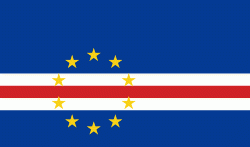
The Cape Verde archipelago was uninhabited until the 15th century, when Portuguese explorers discovered and colonized the islands, thus establishing the first European settlement in the tropics. Because the Cape Verde islands were located in a convenient location to play a role in the Atlantic slave trade, Cape Verde became economically prosperous during the 16th and 17th centuries, attracting merchants, privateers, and pirates. It declined economically in the 19th century after the suppression of the Atlantic slave trade, and many of its inhabitants emigrated during that period. However, Cape Verde gradually recovered economically by becoming an important commercial center and useful stopover point along major shipping routes. In 1951, Cape Verde was incorporated as an overseas department of Portugal, but its inhabitants continued to campaign for independence, which they achieved in 1975. -
Guinea-Bissau
Guinea-Bissau (Guiné-Bissau; ???? ???????; Mandinka: ߖߌߣߍ ߺ ߓߌߛߊߥߏ߫ Gine-Bisawo), officially the Republic of Guinea-Bissau (República da Guiné-Bissau ), is a country in West Africa that covers 36125 km2 with an estimated population of 2,026,778. It borders Senegal to its north and Guinea to its southeast. Guinea-Bissau is the only Portuguese-speaking country in which Islam is the predominant religion.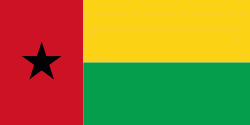
Guinea-Bissau was once part of the kingdom of Kaabu, as well as part of the Mali Empire. Parts of this kingdom persisted until the 18th century, while a few others were under some rule by the Portuguese Empire since the 16th century. In the 19th century, it was colonised as Portuguese Guinea. Portuguese control was restricted and weak until the early 20th century with the pacification campaigns, these campaigns solidified Portuguese sovereignty in the area. The final Portuguese victory over the remaining bastion of mainland resistance, the Papel ruled Kingdom of Bissau in 1915 by the Portuguese military office Teixeira Pinto, and recruited Wolof mercenary Abdul Injai was the event to solidify mainland control. The Bissagos, islands off the coast of Guinea-Bissau, were officially conquered in 1936, ensuring Portuguese control of both the mainland and islands of the region. Upon independence, declared in 1973 and recognised in 1974, the name of its capital, Bissau, was added to the country's name to prevent confusion with Guinea (formerly French Guinea). Guinea-Bissau has a history of political instability since independence, and only one elected president (José Mário Vaz) has successfully served a full five-year term. The current president is Umaro Sissoco Embaló, who was elected on 29 December 2019. -
Mozambique
Mozambique (Moçambique, ; Mozambiki; Msumbiji; Muzambhiki), officially the Republic of Mozambique (República de Moçambique, ), is a country located in southeastern Africa bordered by the Indian Ocean to the east, Tanzania to the north, Malawi and Zambia to the northwest, Zimbabwe to the west, and Eswatini and South Africa to the southwest. The sovereign state is separated from the Comoros, Mayotte and Madagascar by the Mozambique Channel to the east. The capital and largest city is Maputo.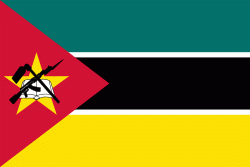
Notably Northern Mozambique lies within the monsoon trade winds of the Indian Ocean and is frequentely affected by disruptive weather. Between the 7th and 11th centuries, a series of Swahili port towns developed on that area, which contributed to the development of a distinct Swahili culture and dialect. In the late medieval period, these towns were frequented by traders from Somalia, Ethiopia, Egypt, Arabia, Persia, and India. -
São Tomé and Príncipe
São Tomé and Príncipe (São Tomé e Príncipe ; English: "Saint Thomas and Prince"), officially the Democratic Republic of São Tomé and Príncipe (República Democrática de São Tomé e Príncipe), is a Portuguese-speaking island country in the Gulf of Guinea, off the western equatorial coast of Central Africa.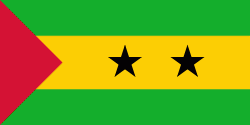
It consists of two archipelagos around the two main islands of São Tomé and Príncipe, about 150 km apart and about 250 and 225 km off the northwestern coast of Gabon. With a population of 201,800 (2018 official estimate), São Tomé and Príncipe is the second-smallest and second-least populous African sovereign state after Seychelles. -
Macau
Macau or Macao, officially the Macao Special Administrative Region of the People's Republic of China (MSAR), is a city and special administrative region of China in the western Pearl River Delta by the South China Sea. With a population of about 680,000 and an area of 32.9 km2, it is the most densely populated region in the world.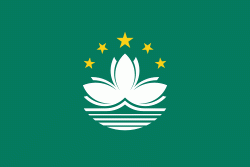
Formerly a Portuguese colony, the territory of Portuguese Macau was first leased to Portugal as a trading post by the Ming dynasty in 1557. Portugal paid an annual rent and administered the territory under Chinese sovereignty until 1887. Portugal later gained perpetual colonial rights in the Sino-Portuguese Treaty of Peking. The colony remained under Portuguese rule until 1999, when it was transferred to China. Macau is a special administrative region of China, which maintains separate governing and economic systems from those of mainland China under the principle of "one country, two systems". The unique blend of Portuguese and Chinese architecture in the city's historic centre led to its inscription on the UNESCO World Heritage List in 2005. -
Gibraltar
Gibraltar is a British Overseas Territory and city located at the southern tip of the Iberian Peninsula. It has an area of 2.6 sqmi and is bordered to the north by Spain. The landscape is dominated by the Rock of Gibraltar, at the foot of which is a densely populated town area, home to over 32,000 people, primarily Gibraltarians.
In 1704, Anglo-Dutch forces captured Gibraltar from Spain during the War of the Spanish Succession. The territory was ceded to Great Britain in perpetuity under the Treaty of Utrecht in 1713. It became an important base for the Royal Navy, particularly during the Napoleonic Wars and World War II, as it controlled the narrow entrance and exit to the Mediterranean Sea, the Strait of Gibraltar, which is only 8.9 mi wide. This choke point remains strategically important, with half the world's seaborne trade passing through it. Gibraltar's economy is based largely on tourism, online gambling, financial services, and bunkering. -
Jersey
Jersey (Jèrri ), also known as the Bailiwick of Jersey, is an island country and self-governing British Crown Dependency near the coast of north-west France. It is the largest of the Channel Islands and is 14 mi from the Cotentin Peninsula in Normandy. The Bailiwick consists of the main island of Jersey and some surrounding uninhabited islands and rocks including Les Dirouilles, Les Écréhous, Les Minquiers, and Les Pierres de Lecq.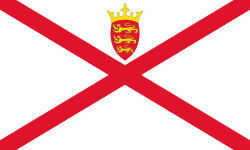
Jersey was part of the Duchy of Normandy, whose dukes became kings of England from 1066. After Normandy was lost by the kings of England in the 13th century, and the ducal title surrendered to France, Jersey remained loyal to the English Crown, though it never became part of the Kingdom of England. -
Portugal
Portugal, officially the Portuguese Republic (República Portuguesa ), is a country located on the Iberian Peninsula, in southwestern Europe, and whose territory also includes the Atlantic archipelagos of the Azores and Madeira. It features the westernmost point in continental Europe, and its Iberian portion is bordered to the west and south by the Atlantic Ocean and to the north and east by Spain, the sole country to have a land border with Portugal. Its two archipelagos form two autonomous regions with their own regional governments. Lisbon is the capital and largest city by population.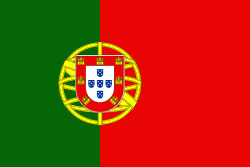
One of the oldest countries in Europe, its territory has been continuously settled, invaded and fought over since prehistoric times. The territory was first inhabited by pre-Roman and Celtic peoples who had contact with Phoenicians, ancient Greeks and Carthaginians. It was later ruled by the Romans, followed by the invasions of Germanic peoples and the Islamic invasion by the Moors, whose rule was eventually expelled during the Reconquista. Founded first as a county of the Kingdom of León in 868, gained its independence as the Kingdom of Portugal with the Treaty of Zamora in 1143. -
Bermuda
Bermuda (historically known as The Bermudas or Somers Isles) is a British Overseas Territory in the North Atlantic Ocean. The Bermuda archipelago consists of 181 islands with a total land area of 54 km2. The closest land outside the territory is in the US state of North Carolina, approximately 1035 km to the northwest.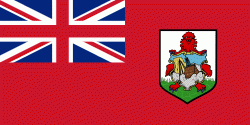
Bermuda is named after Spanish explorer Juan de Bermúdez, who discovered the archipelago in 1505. The islands have been permanently inhabited since 1612, and, forming part of British America, became a crown colony in 1684. The first African slaves arrived in 1616, but as the slave trade ceased by the end of the 17th century, the colony developed into a base for merchants, privateers, and the Royal Navy. More recently, tourism has been a significant contributor to Bermuda's economy. After World War II the territory became an offshore financial centre and tax haven. -
East Timor
East Timor, also known as Timor-Leste , officially the Democratic Republic of Timor-Leste, is a country in Southeast Asia. It comprises the eastern half of the island of Timor, of which the western half is administered by Indonesia, the exclave of Oecusse on the island's north-western half, and the minor islands of Atauro and Jaco. Australia is the country's southern neighbour, separated by the Timor Sea. The country's size is 14874 km2. Dili is its capital and largest city.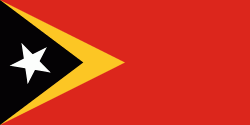
East Timor came under Portuguese influence in the sixteenth century, remaining a Portuguese colony until 1975. Internal conflict preceded a unilateral declaration of independence and an Indonesian invasion and annexation. Resistance continued throughout Indonesian rule, and in 1999 a United Nations–sponsored act of self-determination led to Indonesia relinquishing control of the territory. On 20 May 2002, as Timor-Leste, it became the first new sovereign state of the 21st century. That same year, relations with Indonesia were established and normalized, with Indonesia also supporting East Timor's accession into ASEAN.

